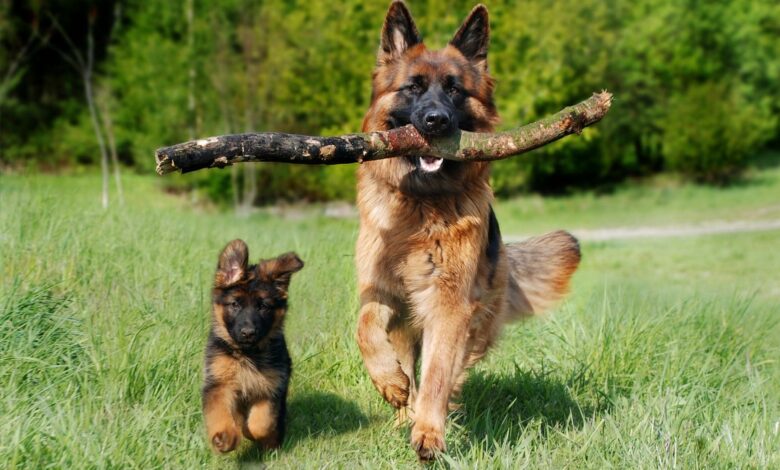Raising a German Shepherd Puppy Essential Tips and Guidelines

Choosing the Right German Shepherd Puppy
When raising a German Shepherd puppy, selecting the right one is crucial for ensuring a harmonious relationship and meeting your household’s needs. The first step is understanding the breed’s characteristics and temperament. German Shepherds are noted for their intellect, devotion, and protective instincts. They are highly trainable and can adapt to various roles, from family pets to working dogs in law enforcement. However, their energy levels and need for mental stimulation require committed and experienced owners.
Finding a reputable breeder is another fundamental aspect of choosing the right German Shepherd puppy. A responsible breeder will prioritize the health and well-being of their dogs over profits. They should be transparent, providing detailed information about the puppy’s lineage and any health issues in the breeding line. Verifying It’s essential to confirm that the breeder adheres to ethical breeding practices and is recognized by reputable kennel clubs or breed organizations.
When selecting a puppy, attention should be paid to both health and behavior. Health considerations include checking for common breed-specific ailments such as hip dysplasia, elbow dysplasia, and degenerative myelopathy. Inquiring about health certifications, such as OFA (Orthopedic Foundation for Animals) or PennHIP evaluations, can provide peace of mind that the puppy is less likely to suffer from genetic conditions. Beyond physical health, observing the puppy’s behavior is vital. The ideal puppy should be curious, friendly, and balanced. A timid, overly aggressive, or excessively shy puppy may signal potential behavioral challenges.
Additionally, meeting the puppy’s parents can offer valuable insights into the puppy’s future behavior and physical appearance. The parents’ temperament, sociability, and overall health are strong indicators of what you can expect as the puppy matures. Engaging with the breeder to understand the upbringing and environment in which the puppies have been raised will further ensure you make an informed decision.
Choosing the right German Shepherd puppy requires diligence and attention to detail. By prioritizing factors such as breed characteristics, reputable breeding practices, health certifications, and observing the puppy’s parents, you can set a solid foundation for a rewarding and long-lasting companionship.
Preparing Your Home for a New Puppy
Bringing a German Shepherd puppy into your home necessitates thoughtful preparation to ensure a safe and welcoming environment for your new furry family member. Puppy-proofing your home is the first critical step. Start by removing or securing hazardous items such as electrical cords, toxic plants, and small objects that could become choking hazards. Safety gates can help restrict access to certain areas, creating a safe space for your puppy to explore while under your supervision.
A designated area or “safe space” for your German Shepherd puppy is essential. This space could be in a quiet corner of your home where your puppy can relax and feel secure. Equip this area with a comfortable bed appropriate for their size, providing them with a cozy spot to rest and sleep. Ensuring this space is away from the hustle and bustle of daily household activities will help reduce stress and anxiety for your new puppy.
Certain items are indispensable when it comes to necessary supplies. Start with a sturdy set of feeding bowls, preferably stainless steel, for food and water. These are durable and easy to clean. A well-chosen crate is also vital. Crates not only serve as a secure spot for your puppy but are invaluable when it comes to house training. Select a spacious crate for your puppy to stand, turn around, and lie down comfortably, but not so large that it encourages them to eliminate one corner.
Engaging toys is crucial for your puppy’s development. Provide a variety of chew toys, puzzle toys, and soft toys to stimulate your puppy’s mind and satisfy their natural chewing instincts. These toys will provide hours of entertainment and exercise, help teething, and reduce destructive chewing behaviors.
Establishing routines is another pivotal aspect of smooth acclimatization. From feeding schedules to potty breaks and playtime, consistency helps build trust and understanding between you and your German Shepherd puppy. Regular routines will foster feelings of security, reduce anxiety, and aid in easier training processes.
By meticulously preparing your home and adhering to these guidelines, you ensure the safety and well-being of your German Shepherd puppy and lay the foundation for a loving and harmonious relationship.
Training and socialization are critical to raising a well-behaved and confident German Shepherd puppy. Establishing a structured training regimen from the outset ensures the puppy develops into a well-adjusted adult dog. Housebreaking is one of the first steps. It’s essential to maintain a consistent schedule for feeding, playtime, and bathroom breaks to teach the puppy where and when it’s appropriate to relieve itself. Positive reinforcement techniques, such as treats and praise, can accelerate learning and establish a positive association with correct behaviors.
Introducing basic commands, such as ‘sit,’ ‘stay,’ ‘come,’ and ‘down,’ is equally important. Training sessions should be short and frequent to hold the puppy’s attention and encourage engagement. Repetition and consistency are key as German Shepherds are highly intelligent but can be distracted easily, especially during their early months. Leash training should begin as soon as possible to instill proper walking manners and prevent future issues like pulling or lunging. A well-fitted harness and a calm, steady approach can make leash training more effective and less stressful for the puppy and the owner.
Early socialization is vital in building a German Shepherd’s confidence and preventing behavioral problems. This involves gradual exposure to various environments, sounds, and experiences, such as car rides, parks, and busy streets. Interaction with other animals and people is equally important. Socialization helps in preventing fear-based behaviors and fosters a well-rounded temperament. Arranging playdates with other vaccinated puppies and attending puppy socialization classes can provide controlled environments for positive interactions.
Overall, consistent training, positive reinforcement, and structured socialization will build a strong foundation for your German Shepherd puppy. Owners can expect to raise a well-behaved and confident companion by investing time and effort in these early stages. These formative experiences are crucial in shaping the puppy’s behavior and relationship with its surroundings, ensuring a harmonious coexistence with its human family and other pets.
Health, Nutrition, and Exercise Needs
Ensuring optimal health, proper nutrition, and adequate exercise is critical for the well-being of a German Shepherd puppy. Regular veterinary care forms the foundation of a healthy start. Begin with a comprehensive health check-up and establish a vaccination schedule, as immunizations protect your puppy from various diseases. Deworming and flea prevention should also be part of your veterinary care regimen.
German Shepherd Puppy need a balanced diet rich in proteins, fats, vitamins, and minerals to support their rapid growth and high energy levels. Select high-quality puppy food specifically formulated for large breeds. It’s vital to follow feeding guidelines provided by the dog food manufacturer or consult your veterinarian to prevent overfeeding or underfeeding. Monitor your puppy’s weight and adjust the portions as they grow.
Fresh fruits and vegetables can supplement a dog’s diet, but ensure these additions are safe. Avoid poisonous foods like chocolate, grapes, onions, and garlic. Hydration is equally essential; always provide access to fresh water to keep your puppy well-hydrated.
Exercise is a cornerstone of a German Shepherd’s well-being. As a highly active breed, German Shepherd Puppy require regular physical activity to promote healthy growth and prevent boredom-related behaviors. Short walks, play sessions, and basic training exercises are excellent ways to meet their exercise needs. Gradually increase the intensity and duration as the puppy matures. Mental stimulation is also essential; enrichment toys and interactive games can keep your puppy’s mind sharp.
It’s essential to be aware of common health issues affecting German Shepherds, such as hip and elbow dysplasia and allergies. Early detection through regular check-ups and preventive care can mitigate these health concerns. Maintaining an open dialogue with your veterinarian will help manage and prevent potential health problems effectively.
By prioritizing these health, nutritional, and exercise guidelines, you ensure that your German Shepherd puppy grows strong and leads a fulfilling and active life.

